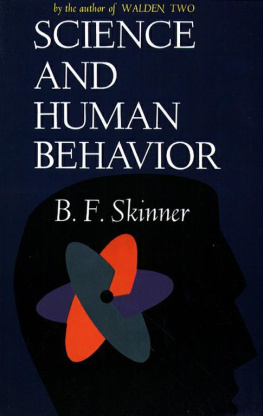B. F. Skinner - About Behaviorism
Here you can read online B. F. Skinner - About Behaviorism full text of the book (entire story) in english for free. Download pdf and epub, get meaning, cover and reviews about this ebook. year: 1974, publisher: Alfred A. Knopf, Inc., genre: Science. Description of the work, (preface) as well as reviews are available. Best literature library LitArk.com created for fans of good reading and offers a wide selection of genres:
Romance novel
Science fiction
Adventure
Detective
Science
History
Home and family
Prose
Art
Politics
Computer
Non-fiction
Religion
Business
Children
Humor
Choose a favorite category and find really read worthwhile books. Enjoy immersion in the world of imagination, feel the emotions of the characters or learn something new for yourself, make an fascinating discovery.

- Book:About Behaviorism
- Author:
- Publisher:Alfred A. Knopf, Inc.
- Genre:
- Year:1974
- Rating:5 / 5
- Favourites:Add to favourites
- Your mark:
- 100
- 1
- 2
- 3
- 4
- 5
About Behaviorism: summary, description and annotation
We offer to read an annotation, description, summary or preface (depends on what the author of the book "About Behaviorism" wrote himself). If you haven't found the necessary information about the book — write in the comments, we will try to find it.
About Behaviorism — read online for free the complete book (whole text) full work
Below is the text of the book, divided by pages. System saving the place of the last page read, allows you to conveniently read the book "About Behaviorism" online for free, without having to search again every time where you left off. Put a bookmark, and you can go to the page where you finished reading at any time.
Font size:
Interval:
Bookmark:


VINTAGE BOOKS EDITION, February 1976
Copyright 1974 by B. F. Skinner
All rights reserved under International and Pan-American Copyright Conventions. Published in the United States by Random House, Inc., New York, and simultaneously in Canada by Random House of Canada Limited, Toronto. Originally published by Alfred A. Knopf, Inc., in 1974.
Library of Congress Cataloging in Publication Data
Skinner, Burrhus Frederic, 1904
About behaviorism.
1. Behaviorism. I. Title.
[BF199.S54 1976] 150.19434 75-28042
eISBN: 978-0-307-79784-1
v3.1_r1
To Ernest Vargas and Barry Buzan
Behaviorism is not the science of human behavior; it is the philosophy of that science. Some of the questions it asks are these: Is such a science really possible? Can it account for every aspect of human behavior? What methods can it use? Are its laws as valid as those of physics and biology? Will it lead to a technology, and if so, what role will it play in human affairs? Particularly important is its bearing on earlier treatments of the same subject. Human behavior is the most familiar feature of the world in which people live, and more must have been said about it than about any other thing; how much of what has been said is worth saving?
Some of these questions will eventually be answered by the success or failure of scientific and technological enterprises, but current issues are raised, and provisional answers are needed now. A great many intelligent people believe that answers have already been found and that they are all unpromising. Here, for example, are some of the things commonly said about behaviorism or the science of behavior. They are all, I believe, wrong.
1. It ignores consciousness, feelings, and states of mind.
2. It neglects innate endowment and argues that all behavior is acquired during the lifetime of the individual.
3. It formulates behavior simply as a set of responses to stimuli, thus representing a person as an automaton, robot, puppet, or machine.
4. It does not attempt to account for cognitive processes.
5. It has no place for intention or purpose.
6. It cannot explain creative achievementsin art, for example, or in music, literature, science, or mathematics.
7. It assigns no role to a self or sense of self.
8. It is necessarily superficial and cannot deal with the depths of the mind or personality.
9. It limits itself to the prediction and control of behavior and misses the essential nature of being a man.
10. It works with animals, particularly with white rats, but not with people, and its picture of human behavior is therefore confined to those features which human beings share with animals.
11. Its achievements under laboratory control cannot be duplicated in daily life, and what it has to say about human behavior in the world at large is therefore unsupported metascience.
12. It is oversimplified and nave and its facts are either trivial or already well known.
13. It is scientistic rather than scientific. It merely emulates the sciences.
14. Its technological achievements could have come about through the use of common sense.
15. If its contentions are valid, they must apply to the behavioral scientist himself, and what he says is therefore only what he has been conditioned to say and cannot be true.
16. It dehumanizes man; it is reductionistic and destroys man qua man.
17. It is concerned only with general principles and therefore neglects the uniqueness of the individual.
18. It is necessarily antidemocratic because the relation between experimenter and subject is manipulative, and its results can therefore be used by dictators but not by men of good will.
19. It regards abstract ideas such as morality or justice as fictions.
20. It is indifferent to the warmth and richness of human life, and it is incompatible with the creation and enjoyment of art, music, and literature and with love for ones fellow men.
These contentions represent, I believe, an extraordinary misunderstanding of the achievements and significance of a scientific enterprise. How can it be explained? The early history of the movement may have caused trouble. The first explicit behaviorist was John B. Watson, who in 1913 issued a kind of manifesto called Psychology as the Behaviorist Views It. As the title shows, he was not proposing a new science but arguing that psychology should be redefined as the study of behavior. This may have been a strategic mistake. Most of the psychologists at the time believed they were studying mental processes in a mental world of consciousness, and they were naturally not inclined to agree with Watson. Early behaviorists wasted a good deal of time, and confused an important central issue, by attacking the introspective study of mental life.
Watson himself had made important observations of instinctive behavior and was, indeed, one of the first ethologists in the modern spirit, but he was greatly impressed by new evidence of what an organism could learn to do, and he made some rather extreme claims about the potential of a newborn human infant. He himself called them exaggerations, but they have been used to discredit him ever since. His new science was also, so to speak, born prematurely. Very few scientific facts about behaviorparticularly human behaviorwere available. A shortage of facts is always a problem in a new science, but in Watsons aggressive program in a field as vast as human behavior it was especially damaging. He needed more factual support than he could find, and it is not surprising that much of what he said seemed oversimplified and nave.
Among the behavioral facts at hand were reflexes and conditioned reflexes, and Watson made the most of them, but the reflex suggested a push-pull type of causality not incompatible with the nineteenth-century conception of a machine. The same impression was given by the work of the Russian physiologist Pavlov, published at about the same time, and it was not corrected by the stimulus-response psychology which emerged during the next three or four decades.
Watson naturally emphasized the most reproducible results he could find, and most of them had been obtained from animalsthe white rats of animal psychology and Pavlovs dogs. It seemed to be implied that human behavior had no distinguishing characteristics. And to bolster this claim that psychology was a science, and to fill out his textbook, he borrowed from anatomy and physiology, and Pavlov took the same line by insisting that his experiments on behavior were really an investigation of the physiological activity of the cerebral cortex, although neither man could point to any direct observations of the nervous system which threw light on behavior. They were also forced into hasty interpretations of complex behavior, Watson arguing that thinking was merely subvocal speech and Pavlov that language was simply a second signal system. Watson had little or nothing to say about intention or purpose or creativity. He emphasized the technological promise of a science of behavior, but his examples were not incompatible with a manipulative control.
More than sixty years have passed since Watson issued his manifesto, and a great deal has happened in that time. The scientific analysis of behavior has made dramatic progress, and the shortcomings in Watsons account are now, I believe, chiefly of historical interest. Nevertheless, criticism has not greatly changed. All the misunderstandings listed above are to be found in current publications by philosophers, theologians, social scientists, historians, men and women of letters, psychologists, and many others. The vagaries of the early history of the movement can hardly suffice as an explanation.
Font size:
Interval:
Bookmark:
Similar books «About Behaviorism»
Look at similar books to About Behaviorism. We have selected literature similar in name and meaning in the hope of providing readers with more options to find new, interesting, not yet read works.
Discussion, reviews of the book About Behaviorism and just readers' own opinions. Leave your comments, write what you think about the work, its meaning or the main characters. Specify what exactly you liked and what you didn't like, and why you think so.













